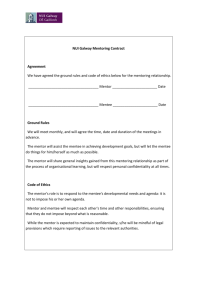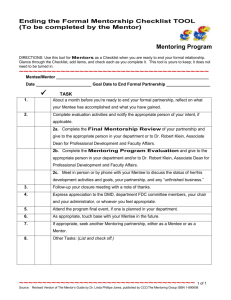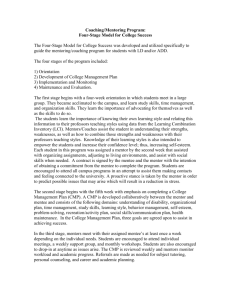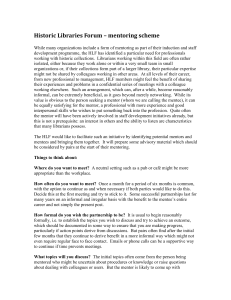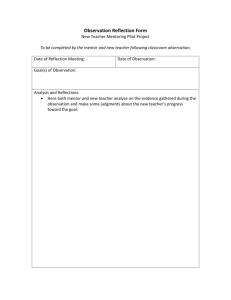Diversity Training with Dr. Harold Bibb
advertisement
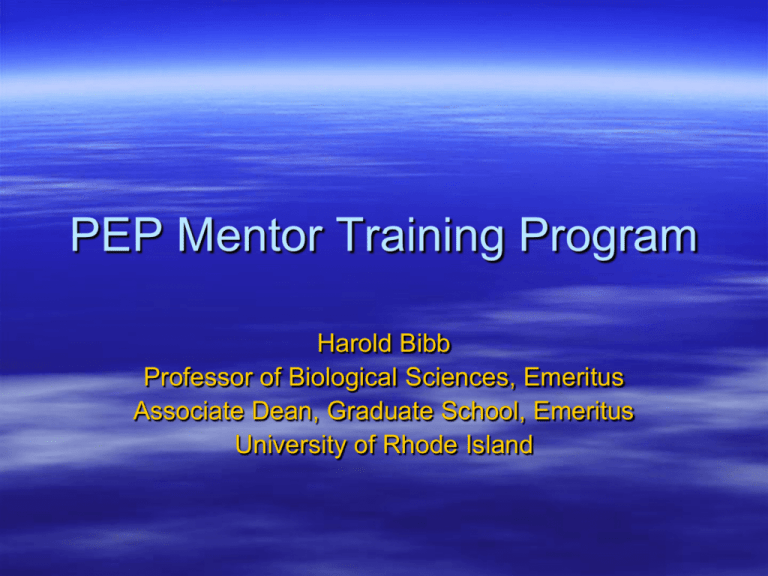
PEP Mentor Training Program Harold Bibb Professor of Biological Sciences, Emeritus Associate Dean, Graduate School, Emeritus University of Rhode Island Defining Mentoring Mentoring is a relationship …. Between two or more people where the mentor provides constant, as needed support, guidance, and concrete help to the protégé…. CARS, The Center for Applied Research Solutions Defining Mentoring A reciprocal learning relationship in which mentor and mentee agree to a partnership in which they work collaboratively toward achievement of mutually defined goals that will develop a mentee’s skills, abilities, knowledge and/ or thinking. Lois Zachary of Leadership Development Essential Components A Welcoming Environment Trust Managing Expectations – Communication A Collaborative Partnership Communication Recognition of Challenges Facing Students of Color A Welcoming Environment A welcoming environment - one that is produced by creating a safe place in which the mentor meets students where they are A Collaborative Partnership Built on Trust To accept the guidance of the mentor, the mentee must trust the mentor. In order for the mentor to provide support, the mentor must trust that the mentee is accepting that support and using it to meet the goals of the relationship. Managing Expectations Communicate ! Different types of conversations: Initial – the first conversation you will have with your mentee, and one of the most important. It sets the tone for the relationship. General in nature, but serves as an introduction to the laboratory, the group, and the work of the laboratory or research group. Managing Expectations Communicate ! Different types of conversations: Goal Setting – remember that goals are mutually set. While the mentor is likely to take the lead in this, it is important that the mentee understands and accepts the goals, both short term and long term. Put goals and expectations in writing, but be ready to modify goals as the work proceeds. Include measurable outcomes. Review the contract regularly, adjust as needed and mutually agreed to. Managing Expectations Communicate ! Different types of conversations: Feedback – How’s everything going? Be supportive but honest in these conversations. Is the student meeting expectations? Are there unexpected areas in which the student needs help? Does the student feel that the mentor is providing the type of support necessary for the success of the project? Listen !!! It’s a partnership! Be sure that the student knows that her/ his views are heard and valued in the relationship. Communicate ! Different types of conversations: Moving On - Ending this part of the relationship and planning next steps. Celebrate the successes of the effort. Be honest in letting the student know the degree to which you are willing to continue a relationship, i.e. provide advice as they move on to the next step in their training, be available via email, are willing to provide recommendations. Let the student know where they stand with you. Recognize Challenges Facing Students of Color Student may come from an environment in which they are the majority. Differences in the social environment. Concern with being an “ambassador” and unwilling to admit that there may be parts of the work that they don’t understand. Being met where they are. “Do I belong here?” Fear of being discovered as an imposter. Develop a sense of Community. Multiple Mentors ? Different mentors will play different roles: – Academic or scientific advice – Professional development – Social mentors – Negotiating the maze Some Do’s and Don’ts of Mentoring Do Provide a welcoming environment Share information Ask their opinion Listen !!! Set expectations Be collegial Provide recognition for achievement Provide support and suggestions and get out of the way Identify measures of success Some Do’s and Don’ts of Mentoring Don’t Micromanage Focus on the “boss” role Exclude them in the communication loop Ignore their opinion Make their goals too easy to reach Protect them from making mistakes Mentoring Resources The Compact for Faculty Diversity www.instituteonteachingandmentoring.org Designing and Customizing Mentor Training www.carsmentoring.org How to Mentor Graduate Students www.rackham.umich.edu/downloads/publications How to Mentor Graduate Students www.grad.washington.edu/mentoring/GradFacultyMentor Mentoring (Responsible Conduct of Research Role Plays) Teaching Research Ethics www.poynter.indiana.edu/tre
